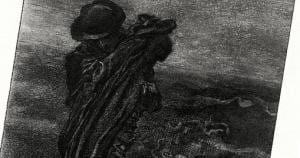 Our pain, my pain, your pain, some we caused, some I caused, pain is real. What is to be done?
Our pain, my pain, your pain, some we caused, some I caused, pain is real. What is to be done?
Shattered by life, we must find a way to be strong. We do not need a pat on the head, condescension, but strength to grow and carry on. A fragile faith cannot survive: the irreligious gurus of the academy or the evangelists on TV are selling a system. Challenge it. Ask: “Yes, but in heaven’s name why would anyone believe any of this?”and nothing is left. If we do not, then God or life will do so through pain.
The collapse of our false reality is sudden and absolute as pain destroys our falsehoods.
Some faiths, reasonable as far as they go, are too brittle for the world. The school for souls, this life, is hard and we grow, but if we adopt an inflexible set of ideas, then we will break. We must flex to thrive and only the flexible survive. Truth is absolute, applied in endless variations full of wonder.
Sadly, the system is broken, we are broken, I am broken, and so we misapply the eternal. Pain is temporal, joy is eternal. We confuse the two.
The Victorians in the English speaking world experienced the wonderful pain of change: challenges to ideas, culture, and old ways that had to go. They responded as people always respond: well, badly, and not at all. Those who ignored the changing times had less pain, but no spiritual heirs. They were anticipatory fossils. Those who responded badly fought the needed change and were broken. Those who embraced the needed and beautiful change, like those who see the glory of each season, found goodness and truth.
Why did many English speaking Victorians miss the beauty of change? They embraced injustice to the poor.
Victorians knew the dark Satanic mills, Dantean horrors, were evil, but still sent children to work there. We shudder, watch a film version of Dickens’ prophetic A Christmas Carol, and do not consider our own vices.
One of my favorite poets, Alfred Tennyson, lost a dear friend at a young age. He was a man of words, so like so many of us with social media, he mourned in public with a poem: In Memoriam. He was a genius, so unlike many of us, he mourned in public brilliantly.
Tennyson began as a conventional Christian in a society that had been Christian for a millennium and a half. He ended a maybe-theist and confused. His poetry faded. His friend died and he mourned as Christians do, but the intellectual culture of the time was eroding his faith.*
The faith had become brittle, because faith was not exercised. If challenged, it could retreat, not even counter-punch, just sloganeer. If “Mother’s prayers are watching you,” what need of science or university education to make converts? Tennyson mourned, as all people do, but he was sorrowful in the context of an age that was stripping him of hope.
Time was looking deep: nature red in claw and fang was millions of years of pain doing nothing for the souls of animals. Against this, Tennyson clung like a drowning man to the hope of Christianity, but not to the intellectually robust defense of the faith. The age did not call up an Anselm, Augustine, or even a Dorothy Sayers or CS Lewis. Too often elite Christians accommodated change, good and bad, and so lost intellectual coherence. The spirit of the age demanded a “scientific racism” and so everyone, but especially secularizing progressives, got worse on racial justice issues.
Deep time, all those deaths over centuries, combined with the terrible death of a friend rocked Tennyson, just as it would rock us. Sadly, the creeds were said, but not deeply believed. Assent and outer show too often had overtaken reality: the Prince of Wales, pious in public, playboy in private.
The rot spread and Tennyson did not in the end have many answers. He knew, somehow, that the old order had changed, giving way to the new, and he did not like all the change. But what was to be done?
Doubt, honest dialog with the world, pain, and wisdom, might have saved Tennyson from much meaningless pain, but doubt was not encouraged:
You tell me, doubt is Devil-born. I know not: one indeed I knew In many a subtle question versed,
Who touch’s a jarring lyre at first,
But ever strove to make it true: Perplex t in faith, but pure in deeds,
At last he beat his music out.
There lives more faith in honest doubt,
Believe me, than in half the creeds. He fought his doubts and gather’s strength, He would not make his judgment blind, He faced the spectres of the mind And laid them: thus he came at length To find a stronger faith his own; And Power was with him in the night,
Which makes the darkness and the light,
And dwells not in the light alone, But in the darkness and the cloud,
As over Sinai’s peaks of old,
While Israel made their gods of gold,
Al tho the trumpet blew so loud.
Just so.
The man who confused toxic doubt, the kind that can never be satisfied or act without near certainty, with the questions a disciple can ask Jesus on the road to Emmaus. We are unsure, we hurt, the horrible pain of a broken world is not like growing pains or hunger. This pain is taken by God and redeemed, but God did not break the world.
Tennyson lived in an age where the best did great good, ending slavery all over the world, feeding the poor, building schools for all: stamping out ignorance and want. The worst misused science to build even greater racism, abuse of wealth, a vast colonial empire for the worldly, fleshly, and devils.
Tennyson, at last, clung to beauty and courage. He did not tell himself lies. Perhaps, in this age, we can do better with the Tennyson’s we meet. We are not their equals, certainly, but we can point them to other ways of thinking, happier ways. We can allow him to combine beauty with truth and so find a goodness otherwise unavailable.
May his soul Rest In Peace.
———————————-
This was not so much the scientific theory suggested by Charles Darwin. First, In Memoriam was written and published long before Origin. Instead it was the philosophical prot0-Darwinism, what he called “ combined with the idea of death over millions of years that was so hard.
Who trusted God was love indeed
And love Creation’s final law—
Tho’ Nature, red in tooth and claw
With ravine, shriek’s against his creed— Who loved, who suffered countless ills, Who battled for the True, the Just, Be blown about the desert dust, Or seal’s within the iron hills 1 No more 1 A monster then, a dream,
A discord. Dragons of the prime,
That tare each other in their slime,
Were mellow music match’s with him.












